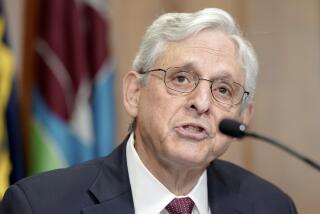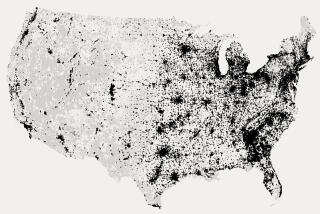Op-Ed: Guns and the no-fly list: Of course we shouldn’t allow suspected terrorists to buy firearms
The Federal Bureau of Investigation added Omar Mateen to its terrorist watch list twice, in 2013 and 2014, then removed him after closing its investigations. Even if Mateen had remained on the list, he would have been allowed to buy a handgun and a Sig Sauer MCX, which he used in last weekend’s mass shooting at the Pulse nightclub in Orlando, Fla.
Opinion asked two writers who follow the gun debate closely to consider whether watch lists, and the no-fly list in particular, should be used to deny Americans the right to purchase firearms. Below, Timothy Edgar of Brown University says the answer is “yes.” Click here for an essay by Charles C.W. Cooke of National Review, who takes the other side.
Our laws prevent many dangerous people from buying firearms or explosives – even if they have never been arrested or convicted of a crime. We bar habitual drug users, people under restraining orders for stalking and domestic violence, and dishonorably discharged veterans. Suspected terrorists, however, are allowed to buy as many guns as they want.
That makes no sense. When law enforcement and intelligence agencies say they have specific and credible information that a prospective gun buyer may be a terrorist, we should listen to them and block the sale. National security often requires hard choices. This is not one of them.
The FBI’s Terrorist Screening Database (TSDB) is perhaps the government’s most important information-sharing tool for preventing terrorist attacks. It was created by order of President Bush in 2003. Names of known or suspected terrorists might come from a police raid in Brussels, a terrorist safe house in Yemen, an NSA intercept or an FBI investigation. Agencies are required to share such intelligence by nominating suspects to the watch list.
At the FBI’s Terrorist Screening Center, analysts vet the intelligence to see if it is specific enough to meet a standard of “reasonable suspicion.” If so, the suspect goes on the list. If there is a threat the suspect will carry out a violent attack, he is placed on the smaller no-fly list, a subset of the TSDB. The list is then shared with agency systems that screen travelers and with the FBI’s information system for state and local law enforcement.
How does a police officer on the beat know if she encounters a suspected terrorist? The TSDB is the answer. If an officer runs a check during a routine stop, she will be alerted of a hit and will be directed to call the FBI.
Because the background check system for firearms is the same as the one used by the police, it includes names from the TSDB. In the past decade, there have been thousands of matches. Because there was no other reason to bar the purchase, the vast majority of these sales were approved. We have no idea how many of these weapons have been used in crimes, terrorist or otherwise, in the United States or elsewhere.
In 2007, the Bush administration urged passage of a law giving the government authority to block suspected terrorists from buying guns. Congress rejected Bush’s sensible “terror gap” proposal, bowing to the National Rifle Assn. President Obama has fared no better. “Right now, people on the ‘no fly’ list can walk into a store and buy a gun,” he said after the San Bernardino attacks. “That is insane.”
While using the terrorist watch list to prevent gun sales would inconvenience those on the list by mistake, there is no reason to fetishize the 2nd Amendment.
Today’s terrorists have shifted from planning spectacular attacks involving airplanes. They prefer to radicalize followers on the Internet, encouraging easily planned carnage. We knew of this trend long before San Bernadino and Orlando. In a video in 2011, an American-born spokesman for Al Qaeda put it bluntly. “America is absolutely awash with easily obtainable firearms. ... So what are you waiting for?”
It’s true, as critics claim, that the watch list is far from perfect. In 2014, the TSDB had 800,000 entries, of which 64,000 were on the no-fly list. One in 10 were Americans. The size of the list raises questions about quality. The system also lacks many ordinary due process safeguards. There is a redress process, but those who complain lack access to the full information – often highly classified – that put them on the list.
Do these problems mean that using the TSDB to screen gun buyers would violate the Bill of Rights? No more than using the list to screen travelers.
According to the Supreme Court, both the right to keep and bear arms and the right to travel are fundamental liberties. The right to travel is exercised far more frequently. While there were 23 million gun sales requiring a background check in 2015, there were almost 900 million travelers on domestic and international flights serving the United States in the same year.
Despite the burden the watch list imposes, federal judges have been unwilling to strike it down, recognizing the government’s national security interests as compelling. In March, a federal judge in Oregon upheld the government’s revised redress process, rejecting the latest challenge by the American Civil Liberties Union.
While using the terrorist watch list to prevent gun sales would inconvenience those who may be on the list by mistake, there is no reason to fetishize the 2nd Amendment over other rights. The no-fly list causes inconvenience and hardship, but not even the ACLU thinks it should be abolished because it understands the need to keep terrorists from boarding airplanes. Preventing terrorists from buying weapons is just as necessary.
The man who sold Omar Mateen the weapons he used in the deadliest mass shooting in American history is Ed Henson, a former police officer who was working in the World Trade Center on Sept. 11. The National September 11 Memorial Museum in New York includes many images of Henson’s fallen comrades in the NYPD. The museum also preserves the chilling videos of hijackers walking unmolested through airport checkpoints as they prepared to mount the deadliest terrorist attack in American history.
The terrorist watch list could prevent the next 9/11. It might also prevent the next mass shooting by a terrorist – if we allow Henson and others who sell guns to use it.
Timothy Edgar is a visiting fellow at Brown University. He served as the director of privacy and civil liberties for the White House National Security Staff under President Obama. From 2006 to 2009, he was the deputy for civil liberties for the director of national intelligence, reviewing the terrorist watch list, among other programs.
Follow the Opinion section on Twitter @latimesopinion or Facebook
ALSO
Op-Ed: Guns and the no-fly list: Whatever happened to due process?
Opinion: We can learn from the Orlando attack, but only if we’re willing to be brave
More to Read
A cure for the common opinion
Get thought-provoking perspectives with our weekly newsletter.
You may occasionally receive promotional content from the Los Angeles Times.






